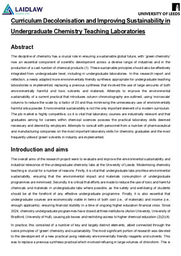Research Outline: Curriculum Decolonisation and Improving Sustainability in Undergraduate Chemistry Teaching Laboratories
Introduction
There can be little doubt that sustainability is now, and will remain in the future, a vital cornerstone of scientific development across a diverse range of industries. It is vital therefore that the same sustainability principles are also effectively integrated from undergraduate level. This research project aims to examine the current laboratory processes used as part of practical elements for the undergraduate courses of Chemistry, Medicinal Chemistry and Natural Sciences at the University of Leeds, and improve both the environmental sustainability and industry relevance of these processes.
Components of the Project
The aims of the research project can be summarised very simply into three broad strands:
- Reduce the use of more environmentally harmful solvents such as dichloromethane and replace with greener more environmentally friendly alternatives.
- Assess the viability of reducing the size of columns used in column chromatography to reduce consumption of materials and therefore environmental impact.
- Consult with pharmaceutical companies regarding the desired laboratory skills for graduates and analyse data collected to identify trends, ensuring that students have ample opportunity to develop the most in-demand skills and techniques in their laboratory courses.
It will hopefully be a pleasure to bring together these three components to create a greatly impactful project.
Conclusion
I am greatly looking forward to starting the 6-week research project later this month. I hope it proves to be a challenging but rewarding period. I would like to thank Dr. Keith Livingstone for being my project supervisor, and once again I would like to thank the Laidlaw Foundation for both their generous funding and for providing me with such a transformative opportunity.


Please sign in
If you are a registered user on Laidlaw Scholars Network, please sign in